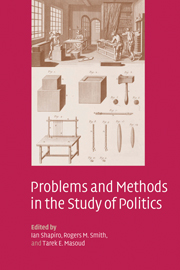Book contents
- Frontmatter
- Contents
- List of contributors
- Acknowledgments
- 1 Introduction: problems and methods in the study of politics
- Part I Description, explanation, and agency
- 2 Problems, methods, and theories in the study of politics, or: what's wrong with political science and what to do about it
- 3 The politics of identities and the tasks of political science
- 4 Political science as a vocation
- 5 The politics of policy science
- 6 The study of black politics and the practice of black politics: their historical relation and evolution
- 7 External and internal explanation
- Part II Redeeming rational choice theory?
- Part III Possibilities for pluralism and convergence
- Index
- References
2 - Problems, methods, and theories in the study of politics, or: what's wrong with political science and what to do about it
Published online by Cambridge University Press: 22 September 2009
- Frontmatter
- Contents
- List of contributors
- Acknowledgments
- 1 Introduction: problems and methods in the study of politics
- Part I Description, explanation, and agency
- 2 Problems, methods, and theories in the study of politics, or: what's wrong with political science and what to do about it
- 3 The politics of identities and the tasks of political science
- 4 Political science as a vocation
- 5 The politics of policy science
- 6 The study of black politics and the practice of black politics: their historical relation and evolution
- 7 External and internal explanation
- Part II Redeeming rational choice theory?
- Part III Possibilities for pluralism and convergence
- Index
- References
Summary
Donald Green and I have previously criticized contemporary political science for being too method driven, not sufficiently problem driven (Green and Shapiro 1994; 1996). In various ways, many have responded that our critique fails to take full account of how inevitably theory laden empirical research is. Here I agree with many of these basic claims, but I argue that they do not weaken the contention that empirical research and explanatory theories should be problem driven. Rather, they suggest that one central task for political scientists should be to identify, criticize, and suggest plausible alternatives to the theoretical assumptions, interpretations of political conditions, and above all the specifications of problems that underlie prevailing empirical accounts and research programs, and to do it in ways that can spark novel and promising problem-driven research agendas.
My procedure will be to develop and extend our arguments for problem-driven over method-driven approaches to the study of politics. Green and I made the case for starting with a problem in the world, next coming to grips with previous attempts that have been made to study it, and then defining the research task by reference to the value added. We argued that method-driven research leads to self-serving construction of problems, misuse of data in various ways, and related pathologies summed up in the old adage that if the only tool you have is a hammer everything around you starts to look like a nail.
- Type
- Chapter
- Information
- Problems and Methods in the Study of Politics , pp. 19 - 41Publisher: Cambridge University PressPrint publication year: 2004
References
- 14
- Cited by

